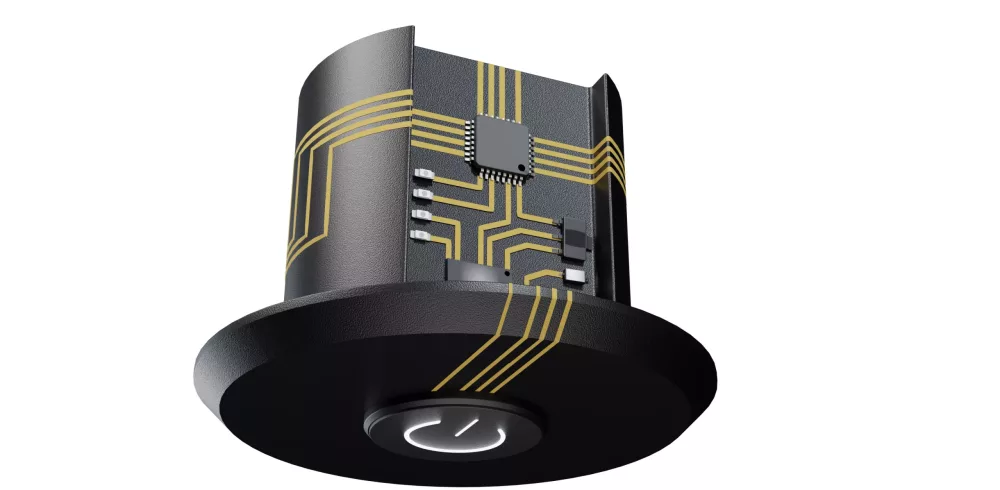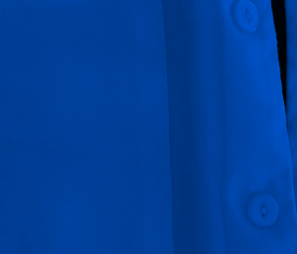Compact and Connected – 3D-Circuits Revolutionizing Wearable Medical Devices
In the ever-evolving landscape of medical technology, innovation is not just a buzzword; it’s a necessity. Wearable medical devices have emerged as game-changers, providing patients with continuous monitoring and healthcare professionals with real-time insights. This requires the integration of reliable and sustainable electronic solutions.
By integrating functions and the three-dimensional routing of circuit tracks, the design space for the electronics of hearing aids can be optimally utilised.
Imagine you need a hearing aid in the future. Today’s hearing aids are quite large and are often visibly placed behind the ear. Wouldn’t it be great to have an in-ear hearing aid which is almost invisible without any limitations? This is where 3D-Circuits come into play, curious?
What is 3D-MID?
3D-MID stands for Mechatronic Integrated Device, also known as 3D-Circuits. This technology is a manufacturing technology which integrates circuits directly into three-dimensional thermoplastic substrates. For example, the housing of a hearing aid, which is needed anyway, is used to support the circuitry on its inside, and a separate circuit board can be replaced. This technology enables the seamless combination of electronic and mechanical functions in a single component, which also eliminates the need of additional connecting points for the antenna. By eliminating these requirements, in-ear devices can be made as small as possible, which not only makes hearing aids nearly invisible, but also improves performance and comfort. This is achieved through customer-designed shapes for a perfect fit to the ear, improving sound quality and minimizing power consumption by reducing the weight of the entire component.
Functional Integration and Miniaturization
Functionality and size constraints are paramount concerns in hearing aids and other medical devices. Here’s where 3D-MID’s technological prowess shines:
Function Density
With 3D-MID, the integration of both electrical and mechanical functions reaches new heights. The result? A higher function density that enables you to pack more capabilities into the same space. This advancement facilitates your pursuit of miniaturization, without compromising on the range of functions, for example improving sound quality and reducing power consumption for hearing aids.
Space Optimization
The quest for function integration and miniaturization doesn’t just save space and weight; it transforms how wearable medical devices are designed and utilized. Imagine delivering enhanced capabilities within a sleeker and more comfortable form factor. With 3D-MID, this imagination turns into reality. For example, hearing aids should be as small as possible, adapting the shape of a human ear and running without having any problems.
3D-Circuits, a Trustworthy Solution
For more than a decade, HARTING has been a reliable 3D-MID supplier for medical products, offering solutions according to your demands. For example, medical grade raw materials or preparation for additional sterilization. We can offer three decisive advantages:
Comprehensive Expertise
HARTING stands out as the world’s only 3D-MID provider with seamless integration of the entire process chain under one roof. From concept design and prototyping to all four manufacturing steps. These are injection molding, lasering, chemical coating and assembly with function control and testing. Every step is done in-house. This approach builds confidence by assuring you of a holistic approach to quality control, avoiding additional interfaces and reducing the risk of unforeseen complications.
Swiss Quality
The “Made in Switzerland” label isn’t just a tag; it’s synonymous with quality, precision and reliability. HARTING’s 3D-Circuits, proudly carrying this label, assures you of adherence to the highest standards. The Swiss-made 3D-MID technology comes with a promise of reliability and adherence to standards, reducing the risk of project hiccups. When your wearable medical devices carry the mark of Swiss craftsmanship, trust becomes an inherent component of your product’s identity. HARTING 3D-MID is based in Biel, the innovative heart of the Swiss watch and micro electronics industry. Biel also is a growing hub for medical technology, optics and precision engineering.
In a rapidly evolving medical technology landscape, it’s important to embrace changes that move you closer to your goals. HARTING’s 3D-MID technology offers you the means to enhance quality, drive innovation, and achieve your vision. With trust, functionality, and miniaturization at its core, this technology is poised to reshape the future of wearable medical devices.
About HARTING
HARTING’s 3D Circuits support the trend of technological miniaturization. With a focus on 3D-MID technology, the family-owned company stands internationally for pioneering miniaturization of components while maintaining full performance by combining electronic and mechanical functions in one component. There are no limits to the shape of these assemblies in the three-dimensional range. In addition, with its 3D circuits, HARTING AG is a leader in the transformation of innovations into cost efficient series production and stands for high delivery capability.
HARTING started its activities in the field of 3D-MID in 2003 and is the technological pioneer in terms of miniaturization. Customers from the automotive, medical technology as well as industrial and consumer electronics sectors benefit from complete in-house production and experienced project management throughout the complete product development phase. For the manufacturing of 3D circuits, HARTING has production equipment for every process step – from plastic injection molding, laser direct structuring, chemical metallization to assembly and quality assurance.
Many years of experience and complete in-house production enable the interdisciplinary team to create intelligent production concepts and ensures optimized process times – which in turn reduces overall costs. The company is located in the innovative heart of the Swiss watch industry in Biel, which is also a growing hub for medical device technologies. This location was chosen wisely, because in this region people have grown up in a world of micromechanics – generation after generation.
Manufacturing & Engineering Magazine | The Home of Manufacturing Industry News















